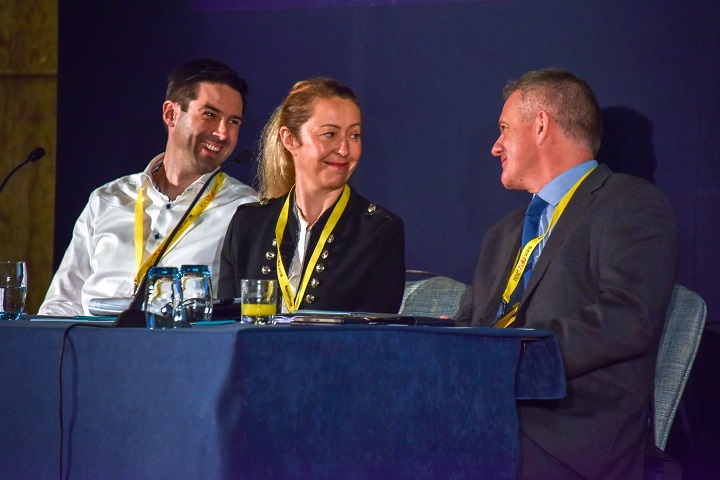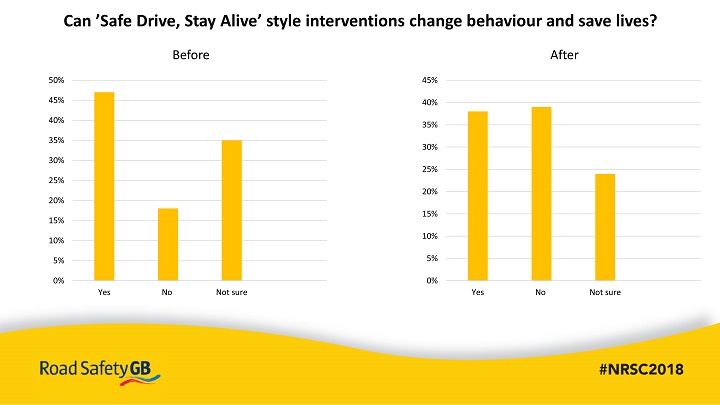
L-R: Dr Neale Kinnear, Dr Jami Blythe and Sean Bone-Knell
Road safety practitioners and academics should come together to develop a standardised version of ‘safe drive, stay alive’ style presentations for delivery across the country.
That was the headline finding following a debate about the topic at the 2018 National Road Safety Conference in Brighton on 28 November.
The debate asked whether ‘Safe Drive, Stay Alive’ (SDSA) style interventions change behaviour and save lives?
The session comprised three brief presentations followed by questions from the audience – and a ‘before and after’ audience poll, in which the results were as follows:

- Pre-debate: Yes: 47% – No: 18% – Not sure: 35%
- Post-debate: Yes: 37% – No: 39% – Not sure: 24%
The presentations were delivered by:
- Sean Bone-Knell, National Fire Chiefs Council lead for road safety
- Dr Jami Blythe, whose Professional Doctorate (DProf) thesis was entitled ‘the role of empathy through storytelling in young driver road safety education’
- Dr Neale Kinnear, principal psychologist at the Transport Research Laboratory
Sean Bone-Knell said there is a place for SDSA, pointing to positive evaluation of the schemes delivered in Surrey and Greater Manchester.
He spoke of ‘incredibly powerful productions’ delivering emotionally charged messages from people with first-hand experience.
However, he acknowledged there is room for improvement and suggested that the next steps for SDSA should include improved coordination and research, and a move towards a single package delivered across the country.
He stressed that the fire service should be seen as a road safety partner, not a competitor
Jami Blythe said storytelling can be used to engage a hard-to-reach audience who are frequently able to relate to this approach – but the use of real stories, rather than fiction, is key to success.
In contrast, Neale Kinnear opened his presentation by saying there is no evidence that these interventions save lives.
He said: “There are numerous examples of well-intended health interventions achieving exactly the opposite of what they aimed to do.
He added that the research tells us this approach is successful at inducing fear (the response we regularly see from SDSA participants), but that this has no consequential effect on behaviour, and that males are most resistant to this type of message.
He argued that ultimately messages of change have to relate to things people feel they have some control of, such as penalty points and fines, but not crashes.
He stressed he was ‘not here to bash these interventions’ but added that ‘a broader perspective’ is required.
Laressa
There’s an outstanding proposal from RSGB to determine what a model based on best available evidence would look like with a view, if such is possible, to offering a single best practice platform for any organisation or partnership committed to delivering SDSA style interventions.
More broadly, DfT have commissioned significant research into various types of interventions, chosen because of the level of confidence afforded by the evidence bases they already have with the intention of determining whether or not they are, under additional scrutiny, fit for being recommended as effective practice.
I would challenge the notion that the public don’t want evaluation and analysis. They want answers and results and in the complex environment of road safety that cannot be disassociated from doing our due diligence and avoiding inadvertent harm.
Jeremy, Exeter
+4
This was a really good debate, but we seem to keep going round the buoy on this subject and also other road safety initiatives.
Having time to evaluate and analyse is not always what the public want and unfortunately we need to react to what is happening now.
Would it be possible for RSGB to commission the academics to look at what initiatives are working or what needs to be done to make them work and all Forces adopt the same working methods and initiatives.
Laressa Robinson, Dorchester
+3
Sean Bone-Knell is right: SDSA as currently delivered has emotional impact.
Dr Jami Blythe is right: stories are engaging and may prompt action.
Dr Neale Kinnear is right: all threat and no coping strategies can be counterproductive.
Time for a change.
Steve Stradling, Greater Manchester
+7